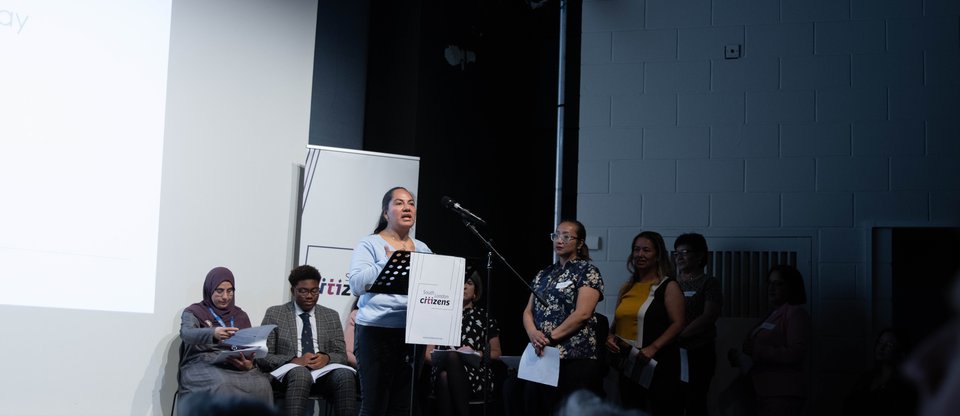Living Wage and Mental Health: Reflections from Empoderando Familias
Living Wage and Mental Health: Reflections from Empoderando Familias
We cannot talk about mental health without talking about a real living wage.
Research shows low pay has a significant impact on well-being. A recent study by the Living Wage Foundation found that 69% of workers on low pay reported pay as negatively impacting their levels of anxiety and quality of life, with women more likely to be affected. These figures have shown a steady increase as a result of the cost-of-living crisis.
Leaders from Empoderando Familias, part of South London Citizens, have been organising for a real living wage and better mental health services with South London Listens, a campaign organising for a stronger and healthier community for South Londoners.
This began with a listening campaign where friends, neighbours and fellow workers met to discuss what was impacting their mental health. With each meeting, it became clearer what was at the root of this problem.

Martha: “We carefully listened to one another and identified that precarious working conditions were heavily impacting our mental health.”
This powerful listening campaign validated the experience of one was shared by many; low pay was impacting their mental health. On World Mental Health Day, South London Listens hosted an assembly celebrating the progress the campaign had made so far and the next steps to improving community mental health access and services. Leaders, such as Lulú Ruth and Maida from Empoderando Familias, shared their stories and the overwhelming impact low pay has on mental health.


Lulú: “The impact of working as a cleaner is felt in the body and the soul. The impact is felt when we get up at dawn, long before the sun rises, or when we stay up very late covering our work shifts in solitude, in silence, making sure that everything is back in its place.
Ruth: “Many cleaners are single parent so for parents of two or three kids, it is very difficult to sustain a household with just one source of income—a difficult task to balance home life and work. This lack of balance makes everything more difficult, provoking high levels of stress from a feeling that we are neither good enough parents nor good enough to manage our households. This same stress also affects our work.
Maida: “The impact of our work is not only felt in our bodies, but also in our minds. Sometimes cleaners do not have the time, capacity, energy or resources to clean our own house. This is how our mental health feels that our ability to order our own house has been depleted. For a worker that is struggling to make ends meet, economic stability will always be a concern that puts immense pressure on our mental health.
“A Real Living Wage is a minimum respite that guarantees some economic security and stability, especially in times like the present. A step into tidying our own house.”
Organising with South London Citizens, Leaders from Empoderando Familias have helped secure new commitments by three leading NHS trusts in South London which include, a real Living Wage for all staff, both internal and contracted staff.
By championing the real living wage, employers can do more than just do the right thing. They are directly contributing to the wellbeing of workers, families, and communities giving the financial security and time for people to care for themselves and ‘tidy their homes’.

A real living wage is needed now more than ever. Find out how you can get involved in the movement below.




